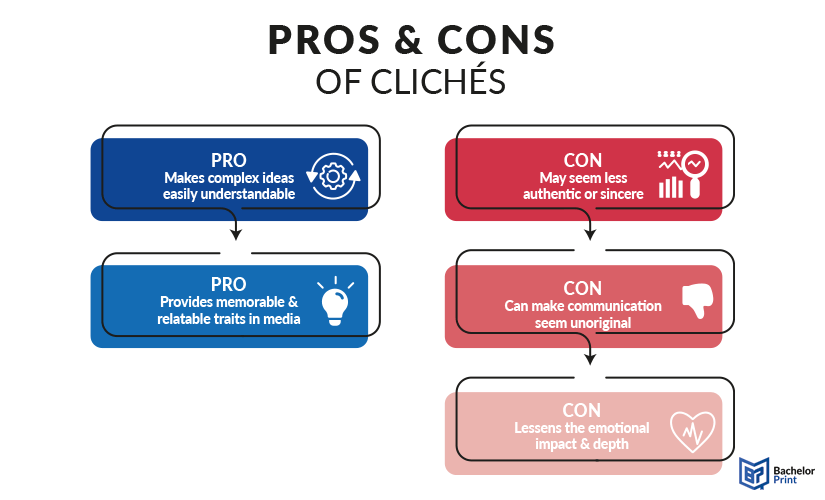
Sayings are widespread and concise expressions that convey more profound meanings, observations, or wisdom about life. One such saying is a cliché. The difference, however, is that this form of saying has become overused and trite. They start as catchy and profound, but lose their impact over time due to excessive repetition. Clichés can appear in everyday language, literature, or popular culture. In this article, you will find out more about this specific type of saying.
Definition: Cliché
The word “cliché” derives from the French language and means stereotype. It can be used as a noun, but also as an adjective. When “cliché” is used as an adjective, it refers to something that is overly familiar, predictable, or lacking in originality due to excessive use.
The noun originally referred to a printing plate used to reproduce images or text multiple times. Over time, the term evolved to metaphorically describe something that has ended up so commonly used in speech, writing, or pop culture that it lacks freshness and evokes a sense of predictability or lack of originality.
Especially in writing, it is crucial to be creative and come up with something new, instead of reusing a clichéd story that has been done dozens of times. To expand your understanding, here are a few examples:
Etymology
The etymology of “cliché” originates from French, with a history rooted in the printing industry. It comes from the word:
- clicher — meaning “to click” or “to make a click”
The term was used to describe the sound created by a metal plate when it was struck to fabricate a stereotype plate, a duplicate made for printing. The notion of repetitive clicking echoed the concept of repetition, leading to the metaphorical usage of “cliché” for phrases or ideas that have been overused to the degree of losing their originality and impact.
Examples
At times, clichés are so deeply ingrained in our everyday lives that they find their way into our language almost unconsciously. In the following, you will find examples of well-worn clichés used in different fields, such as everyday language, literature, shows, and lyrics.
Everyday language
These clichéd expressions are often used to convey wisdom about life but, due to their excessive use, fail to be thought-provoking.
Literature
In the realm of literature, where every word carries the weight of its meaning, the artistry lies in crafting narratives that resonate deeply with the human condition. Yet, some writers often go back to overused sayings.
Shows
Television and cinema serve as canvases for storytelling, where visual and verbal narratives intertwine to illustrate, challenge, and shape our societal norms and fantasies.
Lyrics
Lyrics wield the power to encapsulate emotions and moments, turning melodies into anthems of personal and collective journeys. You can see an artist’s true originality when it comes to writing songs; unfortunately, it is not uncommon to hear the same lyrics from different singers or rappers in their respective genres.
Types of clichés
Clichés can manifest in various forms across language, literature, and media, each serving as a shorthand for more complex ideas or emotions but often criticized for their lack of originality.
These are the overused expressions in everyday speech and writing that come to mind quickly and are widely understood. They are often criticized for being a lazy form of communication. They can serve as conversational shortcuts, but may also detract from the speaker’s or writer’s perceived originality.
This form of cliché refers to narrative scenarios or situations in literature, movies, and television that are overly familiar and predictable. While they can provide a familiar structure that resonates with audiences, their overuse can lead to boredom and a sense of predictability.
These are stereotypical characters (also known as walking clichés) that appear repeatedly across various stories and media. While these characters can quickly establish a story’s dynamics, relying too heavily on them can reduce the complexity and depth of character development, making stories feel derivative.
In visual arts and media, these are recurring images, motifs, or visual tropes that have been overused in film, television, art, and advertising. These visual clichés arise from their effectiveness in conveying certain emotions or themes but can become tired and lack originality when used excessively.
This form encompasses ideas and themes that have been used so extensively in art, literature, and other discourses that they no longer offer fresh insight or provoke thought. These concepts are deeply embedded in cultural storytelling but can become clichéd when they are not explored with new perspectives or depth, leading to predictable and uninspiring narratives.
Linguistic clichés can be broader, encompassing not only phrases but also certain idiomatic expressions, jargon, and even stylistic elements that have become overused within a language or cultural context to the point of becoming predictable or banal.
Thought-terminating cliché
This type is also known as a semantic stop-sign or a thought-stopper, and is worth mentioning as it is a commonly used phrase intended to end a discussion or argument by dismissing complex ideas or critical thinking. They effectively halt further consideration or debate on a topic by providing a simplistic or emotionally charged responses. Below, are some common examples.
Problems
Commonplace clichés can cause problems in writing and communication since they are overused, lack originality, and can be indicative of lazy thinking or writing. Here are a couple of issues with clichés, each illustrated with examples.
Compromising credibility
The use of clichés can make the speaker or writer seem less creative, thoughtful or insightful, potentially undermining their credibility or the seriousness with which their message is received.
Predictability
Predictability in communication occurs when the audience can easily guess what will be said or happen next, which can diminish their interest and commitment. Here are a few common phrases to underline this point.
Reducing emotional resonance
They can dilute the emotional impact of communication because their overuse has made them emotionally flat and unable to convey the depth of the intended feeling.
- ✓ 3D live preview of your individual configuration
- ✓ Free express delivery for every single purchase
- ✓ Top-notch bindings with customised embossing

Benefits
While there are a few scenarios where employing a cliché as a literary device is permissible, it’s necessary to choose them wisely. Below are two instances where their usage is deemed acceptable.
Simplification
Clichés can condense complex concepts or sentiments, which enables clearer communication, or they can explain beginning level concepts for a younger audience.
Characterization
Authors may choose to portray a character’s lack of originality by having them use clichés in their speech or thoughts, especially with stereotypical characters in a comedy setting.

FAQs
Examples of clichés are the sentences:
- “A picture is worth a thousand words.”
- “Best thing since sliced bread.”
It can refer to a saying, a character archetype, or a story concept that has been overused to the extent that it loses its original meaning.
An example of the use in a sentence would be:
“It is a cliché to give good characters a happy ending and the villains a bad one.”
- “You only live once.”
- “To each their own.”
- “Just because.”
- “What can you do?”
- “Let’s agree to disagree.”
